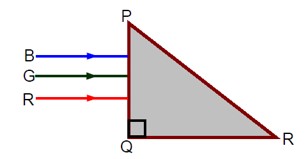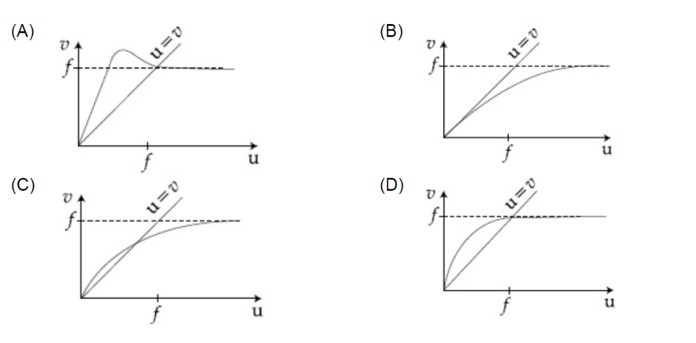Physics Ray Optics and Optical Instruments
Get insights from 140 questions on Physics Ray Optics and Optical Instruments, answered by students, alumni, and experts. You may also ask and answer any question you like about Physics Ray Optics and Optical Instruments
Follow Ask QuestionQuestions
Discussions
Active Users
Followers
New answer posted
5 months agoContributor-Level 10
Let us take a look at the various applications of Total Internal Reflection in real life:
Total internal reflection is the foundational phenomenon used in modern telecommunications, internet cables and medical imaging. Light travels through thin and flexible fibres, which are made of glass and plastic. This light, then, undergoes Total internal reflection in the inner walls of the fibre, which allows travelling long distances with minimum loss.
Mirage is a phenomenon that occurs due to the total internal reflection as light gets reflected between the layers of air.
Diamonds shine because of total internal reflection. The gem is cut
New answer posted
5 months agoContributor-Level 10
Mirage is formed due to total internal reflection in the following way:
On a hot day, the air near the ground becomes extremely hot as compared to air above it since hot air is less dense than cooler air, which has a lower refractive index.
Light from the sky travels toward hotter and less dense air near the ground. As this light enters the hotter layer, it will bend away from the normal because of the change in refractive index.
In case the angle of light is steep enough, it will exceed the critical angle between two layers of air. The light, instead of bending, reflects back up as a result of total internal reflection.
This reflected lig
New answer posted
5 months agoContributor-Level 10
θ? > I = θ ⇒ sinθ? > sinθ ⇒ 1/μ > sinθ
⇒ μ < 1/sin
Note: If we assume θ = 45° ⇒ μ < 1.414, then red colour light ray will come out from face PR of prism.
New answer posted
5 months agoContributor-Level 10
Given the refractive index μ = λ? / λ = 3/2 and v = 10m, the object distance is u = - (3/2)v = -15m.
Using the lens maker's formula:
μ/v - 1/u = (μ - 1)/R
(3/2)/10 - 1/ (-15) = (3/2 - 1)/R
This gives the radius of curvature R:
R = -30/13 m
New answer posted
5 months agoContributor-Level 10
Image by objective must be at focus of eye piece.
1/v - 1/u = 1/f?
1/5 - 1/u = 1 ; u = -5/4 cm
Hence, N = 50.
New answer posted
5 months agoContributor-Level 10
V = I? (G + R? )
1 = I? (G + R? )
2 = I? (G + R? + R? )
2 = 1 + I? R?
I? R? = 1
R? = G + R?
New answer posted
5 months agoContributor-Level 10
Refractive index (n) is a dimensionless quantity that has no units. Since both numerator and denominator are in meters per seconds (m/s), both units cancel each other. This makes refractive index simply a number.
New answer posted
5 months agoContributor-Level 10
Absolute refractive index is the ratio of speed of light in air/vacuum to speed of light in any medium. It is closely related to refractive index, except that it is relative to vacuum and not to any other medium. This is different from relative refractive index because it is the ratio of speed of light in one medium compared to the speed of light in another medium.
New answer posted
5 months agoContributor-Level 10
This type of refraction is the bending of light rays when they pass through the atmosphere of Earth because of the change in the air density. The density of air varies with pressure and temperature.
Due to the atmospheric refraction, celestial objects appear higher than they actually are. This leads to an advanced sunrise and a delayed sunset as well as the twinkling of stars.
When light from space enters the Earth's atmosphere, it slows down and changes direction as light moves from a rarer to a denser medium, which causes refraction.
New answer posted
5 months agoContributor-Level 10
The refractive index is an optical property of the material that describes how much does the light bend or refract while passing from one medium to another. It is the ratio of spee of light in vacuum (c) to speed of light in a material (v) Refractive index is the reason which causes refraction. When light travels from a rarer medium (low refractive index) to denser medium (higher refractive index), it will slow down and bend toward the normal. Refractive index also changes according to the wavelength of light. Air has 1.003 refractive index, water has 1.33 refractive index and glass has a refractive index of 1.5 to 1.9.
Taking an Exam? Selecting a College?
Get authentic answers from experts, students and alumni that you won't find anywhere else
Sign Up on ShikshaOn Shiksha, get access to
- 66k Colleges
- 1.2k Exams
- 685k Reviews
- 1800k Answers


